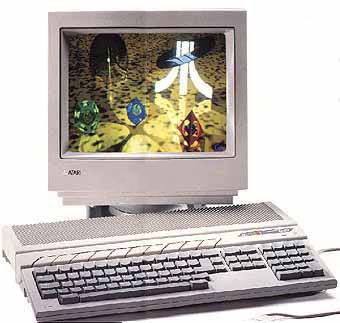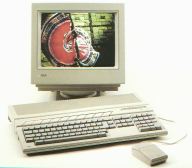Atari
Technical Overview[Amiga] [Apollo] [Atari] [Mac II] [Mac Entry Level] [Mac Quadra] [Mac AV] [NeXT Architecture] [Radius Rocket] [Sun 3 Series]
Overview
Once upon a time there existed personal computers like the TRS-80 (a.k.a. TRaSh-80), the Commodore 64, Texas Instruments, Apple ][e, and then expensive IBM PC. It was a time of darkness, and out of the darkness came professional computers that could be used for a variety of tasks: Atari 400, 800, 1200. Later models were introduced with the 7MHz 68000 processor and these were dubbed the ST (Sixteen bit to Thirty-two bit) series, one of them being the Atari 1040STe which was later replaced by the Atari MegaSTe which sported a 16MHz 68000. The Mega series was an effort to market computers with a detached keyboard from the main computer.
These computers were remarkable for their time, but advancing technologies showed that these computers were deplorably slow. To make matters worse, the video used main processor memory to draw the video which severely deprecated the overall system performance. The Atari TT030 (Thirty-two bit to Thirty-two bit) was introduced a year later which had a 32MHz 68030 processor. This outperformed equivalent Macintoshes and Amigas at that time. Though more video resolutions were supported, the shared memory for processor and video severely slowed the overall performance. Ataris with their built-in MIDI ports and rich advanced MIDI software were popular in the music industry. This synergy in the music market was remarkably increased when Atari introduced their last computer called the Falcon which had a 16MHz 68030 processor and a Motorola DSP processor. Comparably 68040 machines were introduced by Apple, but the market was still rich for 68030 computers, especially with all the ports and features including an SCSI2 interface of this machine. The Falcon architecture was licensed by CLABS and newer models were sold. Medusa cloned the TT030 machines and currently sells a computer Hades that has ISA and PCI slots.
Linux/m68k
Generally Linux/m68k runs on any MC68020 with an external MC68551 PMMU (Paged Memory Management Unit) processor. Other processors after the MC68020 have a built-in MMU (Memory Management Unit) with exception of the MC68EC030 and other EC processors which cannot work with Linux/m68k. It is good to have an FPU (Floating Point Unit) or math co-processor as it is slow to use an emulator and difficult to configure. Commonly, MC68881 math processor is used with the MC68020 and the MC68882 is used with the MC68030. The newer MC68040 contains a built-in math coprocessor. The MC68LC040 does not have the built-in math coprocessor.
Both the Atari TT030 and the Falcon contain MC68030 and thus will run Linux/m68k. Other clones advancing the Atari architecture may also work with Linux/m68k. Currently two vendors of prominence are supported which are CLABs whom advance the the licensed Falcon technology and Medusa whom seem to advance the desktop TT series.
Components
I really don't know
Ports
I really don't know
Statistics
Atari 1040STe
- Processor: 7MHz MC68000
- Audio: 4 channel stereo
Atari MegaSTe
- Processor: 16MHz MC68000
- Audio: 4 channel stereo
Atari TT030
- Processor: 32MHz MC68030
- Audio: 4 channel stereo
Atari Falcon030
- Processor: 16MHz MC68030, 32MHz DSP65000
- Audio: 8 channel 16bit
- Storage: ATA, SCSI2
FeaturesI really don't know exactly. I would like to put emphasis on chip sets. Example, the TT030 has VGA output, the Falcon has SCSI2 output. I will add this later once I obtain more information.
Other Pages of Interests
Nothing at the moment, but I'm open to suggestions


